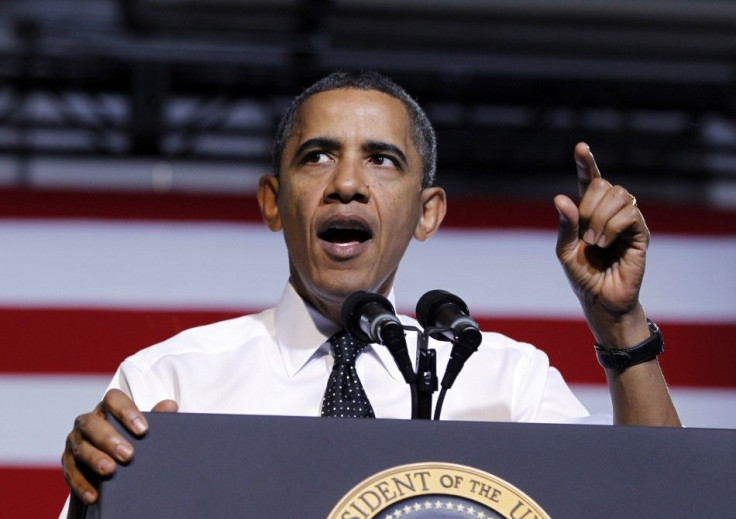Obama Student Loan Plan: A Nod to Occupy Wall Street?

The student debt relief plan that President Barack Obama announced on Wednesday was a nod to the Occupy Wall Street movement, some commentators are saying.
Obama is using his executive-order privilege to speed up the implementation of a law that Congress passed last year, under which eligible borrowers will have to pay a maximum of 10 percent of their income toward their student loans, down from the current maximum of 15 percent, and will have their remaining loans forgiven after 20 years of payments, down from the current 25.
The Occupy Wall Street protesters have not made specific demands, but one of the major issues they have touched on is the skyrocketing cost of higher education and the resulting debt burden for recent graduates.
They say that their parents don't understand, Natalie Havlin, a professor at CUNY City Tech, told The Wall Street Journal, referring to her students. CUNY used to be free, and people are taking out massive loans. Their parents try to help, but they can't do much.
Havlin, 31, added that she still has a ton of student debt.
Unlike Mortgage, Credit Debt, Student Loans Must Be Repaid
Students are having to take out larger loans than ever, and they have no legal recourse if they can't pay -- unlike people struggling with credit card debt or mortgage debt, who have the option of filing for bankruptcy.
Your student loans are with you for life -- both federal and private loans, Robert Applebaum, a lawyer and the founder of ForgiveStudentLoanDebt.com, told MSNBC. There is no recourse for student loan borrowers if they run into trouble. The only recourse they have is to put the loans into forbearance, like I had to do, or economic deferment.
Forbearance allows borrowers to stop paying their student loans temporarily without the lender declaring them in default, but interest continues to accrue, so they owe even more once they do start paying.
We have all these legal protections for big banks and special provisions and loopholes and tax code carvings for the big guys, Matthew Segal, a youth issues activist and president of OurTime.org, told the International Business Times. But where is the protection for the student borrower? For the unemployed 20-something who's still living at home with their parents? For the young person who's underemployed or working three jobs? People feel like the system's been bought and we live in an auctioned democracy where the highest bidder wins.
And student loan debt really can be more devastating than other kinds of debt. Since they are federally guaranteed, a collection agency can take payments directly from paychecks, tax refunds, even Social Security payments, MSNBC's Petra Cahill reported. There is no statute of limitations on student loans: the government will get its money back. And the student who defaults has his or her credit ruined and still has to repay the principal, plus interest and fees from the collection agency.
Obama Going Around a Do-Nothing Congress
The unspoken message Obama is trying to send with his executive order, Segal said, goes something like this: With Congress gridlocked, I can't enact the sweeping reforms I would prefer, but I hear you and will make whatever incremental changes are possible without Congress's cooperation.
The administration is keeping a very close eye on this [and saying], 'We can't take advantage of this populist sentiment that's seemingly in our favor, but at least we're going to use our executive order privileges to make small steps in the right direction,' Segal said.
It remains to be seen whether that message will resonate with young voters, who were one of the biggest demographics to support Obama in the 2008 elections, but many of whom have become disillusioned with the slow pace of progress since then.
Some young people and advocates have already come out and said the executive order does too little.
President Obama's proposal, available to a limited group of students for a limited amount of time, does not address the real student loan problem: rising tuition and the lack of well-paying jobs, the Education Finance Council, which represents nonprofit student loan providers, said in a statement after Obama announced his plan on Wednesday.
Obama himself acknowledged as much in a White House press release.
Steps like these won't take the place of the bold action we need from Congress to boost our economy and create jobs, but they will make a difference, the statement said. And until Congress does act, I will continue to do everything in my power to act on behalf of the American people.
Segal said that despite the limited nature of the executive order, it could still help Obama win over the Occupy Wall Street demographic.
I think every policy that benefits young people, so long as the administration is capable of marketing it, will help him at the polls, Segal said. The question is, can they really market their successes? They have not done an excellent job of explaining how these policies they've passed affect people's lives.
© Copyright IBTimes 2024. All rights reserved.











